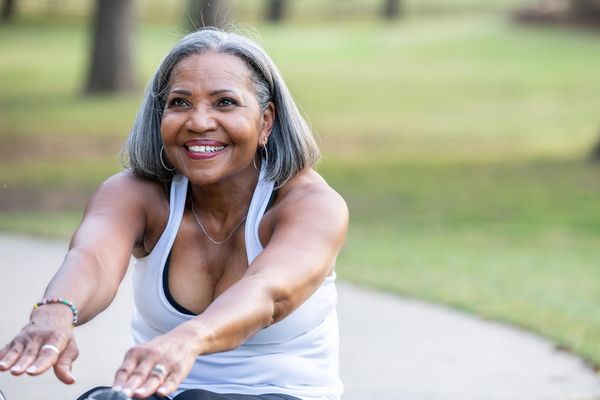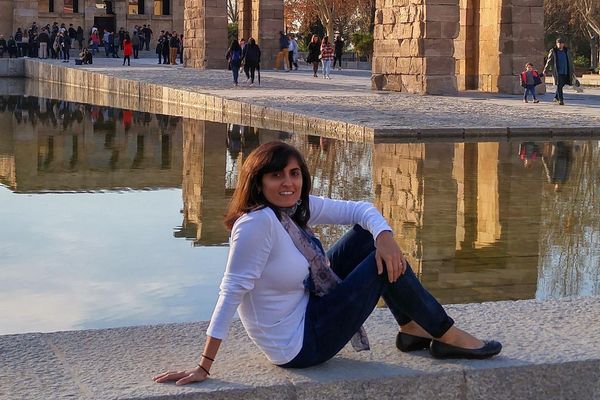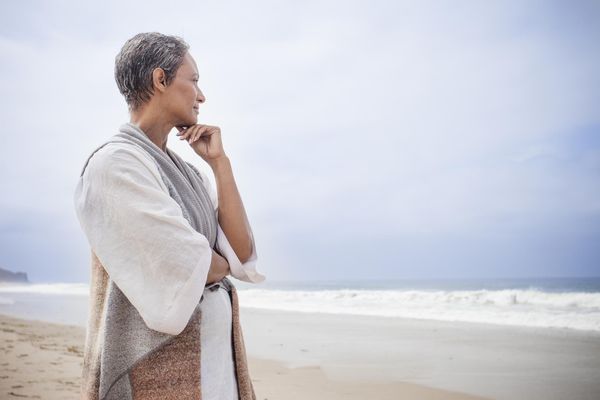By the time I was 27, I was so used to being sick that I knew no other way of life. I had chronic diarrhea and bouts of dramatic weight loss. I was often nauseated and fatigued, and my stomach was on fire with pain. Usually I just attributed the discomfort to stress. But that year my symptoms became so intense that I went to my primary care physician (PCP) for bloodwork.
My PCP informed me that I had a very low blood count. She believed I was passing blood microscopically somehow. Microscopically passing blood? That sounded crazy. "Through my vagina?" I asked, not knowing from where else I could be bleeding. But after hearing my symptoms, my doctor ruled out that idea. She suspected the blood loss was coming from my bottom and referred me to a gastroenterologist to undergo a colonoscopy.
And so my decade-long journey with Crohn's disease began. At first, the gastroenterologist thought I had ulcerative colitis, an inflammatory bowel disease (IBD) that creates ulcers within your digestive tract. The gastroenterologist was a nice guy, but not terribly thorough. He merely gave me a pamphlet on ulcerative colitis, a list of foods I couldn't eat (basically anything with fiber, caffeine or dairy) and a prescription for aminosalicylates to control inflammation in the lining of my digestive tract, and sent me on my way.
I really wanted the medication to work, but it only made me feel worse. Even when following the strict diet, I was constantly passing stool, along with mucus and blood. Lying on the sofa one night, my mother tried to soothe me, but the abdominal pain was so agonizing I couldn't even yawn. My mother called an ambulance, and I was rushed to the hospital. It wouldn't be my last time there. As the years went on and my symptoms persisted, I became practically a regular at the ER, often getting there myself via Uber.
Finally, in my early 30s, I was diagnosed with Crohn's disease (also an IBD condition), which causes chronic inflammation in your GI tract. Reading through the symptoms — abdominal pain, persistent diarrhea and rectal bleeding, among other manifestations — Crohn's made a lot more sense to me than ulcerative colitis.
Grateful for an accurate diagnosis, I was, as always, motivated to take charge and finally get this condition managed. I started on a new treatment plan that entailed giving myself injections. For a while, I felt better, and my Crohn's symptoms became more manageable.
But then the scariest event of my illness happened: My navel was leaking an odorous fluid. Doctors were afraid that my intestines were pushing through my abdomen. I met with a stoma nurse who marked my abdomen for placement for a stoma. That was the only option I was offered.
I woke from surgery with my abdomen still intact, and I felt my stomach, but there was no stoma. I was informed that I had developed an infection behind my umbilical entrance (belly button) related to Crohn's and that is what caused the challenges. A close call is what I called it!
Even though I didn't wind up needing a stoma, I still had to have emergency surgery to remove my entire navel because of the infection. Again, I was determined to fight this horrible condition and to finally take ownership of my body — even if it meant surrendering a part of it.
But Crohn's just wouldn't quit. No matter how hard I fought, it still found a way to hurt and drain me. Soon after the surgery, my rectal area became so inflamed I couldn't sit down. My mental health was spiraling as my life became increasingly built around Crohn's — and ways to conceal it.
I developed anal fissures and fistulas that made my bottom hurt so much I could hardly walk. If anyone asked why I was limping, I said it was because I'd injured my knee. I would fast all day long just to avoid having to go to the bathroom at work.
I began to seriously question how I could go on this way. The answer I kept coming back to was that I couldn't. Crohn's would always find ways to make me miserable and in peril. Until I took the most drastic measure: undergoing a loop colostomy. That meant having a colostomy bag affixed to my abdomen, collecting my body's waste.
The thought of losing this core piece of my body, and the image of a colostomy bag, made me feel uncomfortable and vulnerable. But I persisted in educating myself until I had an epiphany: A colostomy wouldn't mean losing control of my body; it would mean gaining control of it after all these years of suffering.
By the time I was on the operating table for a loop colostomy at 37 years old, I was so educated on Crohn's and ostomies that I radiated confidence. Never before had I felt so in command and so ready to live my life unfettered by fear and lies and shame. I wished I'd felt that self-assured and empowered earlier.
Almost immediately after the ostomy surgery, I felt amazing in a physical way that I had never known. I was healthy again and gaining back the weight I'd traumatically shed over the years.
But though I finally felt free, my mind was struggling with a major stumbling block: I had never seen an African American woman like myself dealing with Crohn's disease or having a colostomy bag. Who could I turn to for one-on-one support?
I didn't know where to begin, so I began with myself.
I launched an Instagram account called crohns_and_sexxy with the goal of meeting others like me living with Crohn's. I found that hundreds of other Black women (and men, too) were seeking support and advocacy. They, too, needed an example of a self-possessed and beautiful human living their best life with Crohn's.
Now, not yet a year after my ostomy surgery, I understand that I went through all those trials and tribulations, all those medical conversations and unanswered questions, so that I could become who I was meant to be: a Crohn's warrior.
In addition to my Instagram account, I co-host a podcast called "Crohn's Veteran" and serve as an ambassador for Color of Crohn's and Chronic Illness, an organization that helps African Americans living with Crohn's or other chronic illnesses.
Today, I receive countless messages from fellow Crohn's warriors asking me to share my story, and I am more than happy to — just as I am glad to listen to theirs. Most importantly, I am impassioned to show everyone that we don't have to hide behind this disease, and we don't have to be afraid of it. Together we can rise above it — flaunt it, even — and let our vibrant souls shine.
This resource was created with support from Bausch Health, Bristol-Myers Squibb, Ferring Pharmaceuticals and Takeda Pharmaceuticals U.S.A., Inc.
- Stomach Pain. Diarrhea. Nausea. Could It Be Crohn’s or Ulcerative Colitis? ›
- Ostomy Basics - HealthyWomen ›
- I Use an Ostomy Bag Because of Crohn's Disease - HealthyWomen ›
- Crohn's Disease: It Didn't Keep Me From the Olympics, and It Won't Stop Me Now - HealthyWomen ›
- Eating Well with Crohn's Disease - HealthyWomen ›







